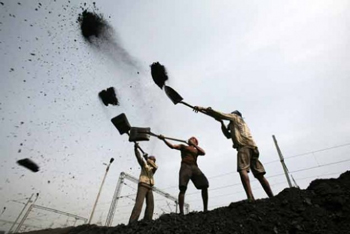 New Delhi, Aug 25: The Supreme Court today termed the method of allotment of coal blocks between 1993 and 2011 as illegal but stopped short of deallocating the blocks that were awarded during the UPA regime.
New Delhi, Aug 25: The Supreme Court today termed the method of allotment of coal blocks between 1993 and 2011 as illegal but stopped short of deallocating the blocks that were awarded during the UPA regime.
The court will take a decision on re-allocation of mines on 1 September, 2014 and will reserve cancellation on a case-by-case basis.
"All allocations were done in an illegal manner and it suffers from vice of arbitrariness," the apext court noted today.
A bench headed by Chief Justice R M Lodha has examined the allegations about alleged irregularities in the allocation of around 194 coal blocks without following proper guidelines and said that the allocation by the screening committee was not fair and transparent.
The coal blocks were alloted in Jharkhand, Chhattisgarh, Maharashtra, West Bengal, Odisha and Madhya Pradesh to private companies and parties bewteen 2004 to March 2011.
However, the SC allowed the coal block allocations to ultra mega power projects to continue but disallowed them from using the coal for any purpose, read commercial exploitation, other than captive consumption.
The apex court said that issue of de-allocation requires further hearing and will take a decision on cancelling 218 coal block allocations on 1 September, 2014. It clarified that more hearings are not required to decide whether coal mining rights should be cancelled or not.
The court also noted that no objective criteria was followed for the allocation process.
The bench, also comprising justices M B Lokur and Kurian Joseph has been monitoring the CBI probe into the scam and special court has been set up to exclusively deal with the prosecution of cases arising out of it in which politicians and businessmen have been named as accused.
The apex court on September 14, 2012 had for the first time issued notice on the PIL filed by advocate M L Sharma and later an NGO, Common Cause and other public spirited persons joined him in the matter which saw CBI facing tough time and government getting pulled up for alleged interference in the probe.
During the hearing, the apex court sought the details of guidelines framed by the Central Government for allocation of coal blocks and examined the process adopted for it.
Lengthy arguments were also advanced as to what were the reasons for "not following the policy of competitive bidding" adopted by the Centre way back in 2004 for allocation of coal blocks.
SC had rejected the contention that the petition based on the CAG report was "premature" as the Public Accounts Committee (PAC) was then slated to examine about the correctness of allocation.
When the petition was filed in 2012, it was alleged that that the CAG has estimated a huge loss of about Rs 1.64 lakh crores to the country in the allocation of coal blocks.
Shares of Hindalco were down 3.38 percent while Jindal Steel and Power were down 5.6 percent on fears that the court may de-allocate some coal blocks allocated to them or impose huge penalties.
The Supreme Court in 2012 had ordered the setting up of a screening committee to consider proposals from the private sector for captive mining.
As many as 70 coal fields were allocated between 1993 and 2005, 53 were given away in 2006, 52 in 2007, 24 in 2008, 16 in 2009 and one in 2010. Altogether, 216 block were allocated between 1993 and 2010, out of which 24 were taken away at different points in time, effectively leaving the total number of allocated blocks at 194. Of these, 39 were assigned to companies before Manmohan Singh's coalition government first took office in 2004.
A CAG report in 2012 pegged windfall gains to allottees in the coal block allocation process to Rs 1.76 lakh crore. The report caused a storm and was the second big scam unearthed during UPA's second consecutive tenure





Comments
Add new comment